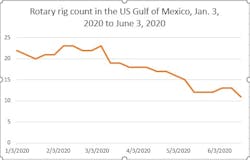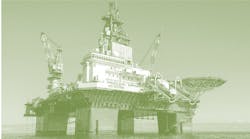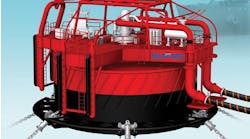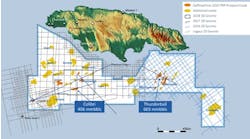A new analysis on Gulf of Mexico E&P activities offered by Wood Mackenzie foresees a difficult year ahead in 2020 but with possible recovery taking place next year. The new report, entitled “After the crash: five key changes in US Gulf of Mexico,” discusses how offshore E&Ps have adjusted their budgets and production levels in response to the 2020 oil price crash.
Written by Mfon Usoro, Research Analyst, US Gulf of Mexico Upstream Oil and Gas, the report finds that:
1. The decline in oil price has wiped off 30% of the remaining value from the US GoM deepwater asset base
2. Roughly $4 billion in investment has been cut from 2020, a 22% reduction from 2019
3. Production could decrease for the first time since 2013, but recovery awaits in 2021
4. Exploration will fall to historic lows in 2020, and a rebound will take time
5. No greenfield projects will be sanctioned in 2020 and subsea tie-back projects could struggle as well.
“The latest oil price crash comes at a time when the US Gulf of Mexico is leaner and nimbler,” the report says. “It is better prepared to weather the storm compared to the last downturn. The region is resilient at low oil prices and nearly 82% of oil production has a short-run marginal cost of $10/bbl Brent. Additionally, over 60% of rig contracts are short-term which gives operators the flexibility to defer capex and maintain positive cashflow.”
The report continues: “Although the US GoM remains afloat, budget cuts in the region have been swift, and some fields have been shut in due to the unprecedented low oil prices. Investment, exploration and project sanctions have all seen major recalibrations.”
In analyzing the full impact of the downturn, Wood Mackenzie says it first isolated the effect of the fall in the oil price. The consulting firm changed its long-term Brent oil price assumption from $60/bbl to $50/bbl and updated the 2020-2022 forward curve prices. “This change alone, not accounting for changes to production or costs profiles on the assets, wiped off roughly 30% of the remaining value (NPV10, Jan 2020) from the US GoM deepwater asset base,” the report noted.
The report noted that: “Depressed commodity prices have an obvious knock-on effect on corporate investment priorities. Taking into account dampened demand as a result of coronavirus and the initial lack of OPEC agreement, we expect capex to fall from our pre-Covid-19 projections by roughly 35% to US$7.4 billion. This represents a 22% decline from 2019 investment. Both the under-development and onstream opportunity sets have felt the pinch.”
The report continued: “The fall in investment caused us to revise our production outlook, as new projects, drilling campaigns, and brownfield phases have faced delays and potential changes of scope. At the start of the year, we predicted production of 2.2 MMboe/d – which would have been another production record in the US GoM. But our forecast has fallen by 200 kboe/d. Recovery in production is expected in 2021. This is because near-term major project start dates have not shifted.”
The consulting firm had expected exploration activity in 2020 to be on par with 2019, which was the first year that exploration saw an uptick in over three years. But in response to announced budget cuts, the firm reduced its exploration forecast by 55% to 15 wells. “This will be a historic low in the region and the recovery will be anything but quick. The downward revision was largely dominated by independents, while the majors and small privates have forged ahead with exploration plans, albeit slightly scaled back.”
The report also noted that prior to April, momentum had been building in US GoM project sanctions and “we expected a new record in 2020 with three greenfield projects requiring total investment of around US$10 billion.” But the oil price crash quickly halted FID plans globally due to the heightened risks. As a result, Wood Mackenzie says that “we do not expect any US GoM project to be sanctioned in 2020.” Unlike the last downturn, where some projects were cancelled, this time project FIDs have simply been deferred, the firm says. This is attributed to the relatively competitive economics of the pre-FID projects in the region, which could come down even further with cost deflation.
NOIA report
At the same time, the National Ocean Industries Association (NOIA) also released a report that highlights the positive economic impacts of Gulf of Mexico E&P.
The report, entitled “The Economic Impacts of the Gulf of Mexico Oil & Natural Gas Industry,” was prepared by Energy & Industrial Advisory Partners (EIAP). It examines the economic impacts of the Gulf of Mexico oil and natural gas industry and the effects of potential leasing and drilling bans.
The study shows that the offshore industry plays a vital role in the economic and energy wellbeing of the US However, Democratic presidential candidate Joe Biden and others have pledged, “No offshore drilling.” Political efforts to limit offshore oil and natural gas production would not only devastate Gulf Coast economies but would damage the US as a whole.
EIAP models three scenarios of what the Gulf of Mexico oil and natural gas industry could look like by 2040: a scenario based on a continuation of current policies and regulations; a scenario examining the potential impacts of a ban on new offshore leases; and a scenario examining the potential impacts of a ban on new drilling permits in the Gulf of Mexico.
NOIA President Erik G. Milito said: “Gulf of Mexico oil and natural gas production is a powerful driver of economic, energy, and national security. Every barrel of oil produced in the Gulf is a barrel produced under one of the toughest safety and environmental regulatory regimes in the world, and is a barrel that Americans do not have to import from countries like Russia and Iran. While some elected officials and political candidates have promised to stop American energy production, including oil and gas production in the Gulf of Mexico, the reality is that these pledges would do untold harm to America.”




